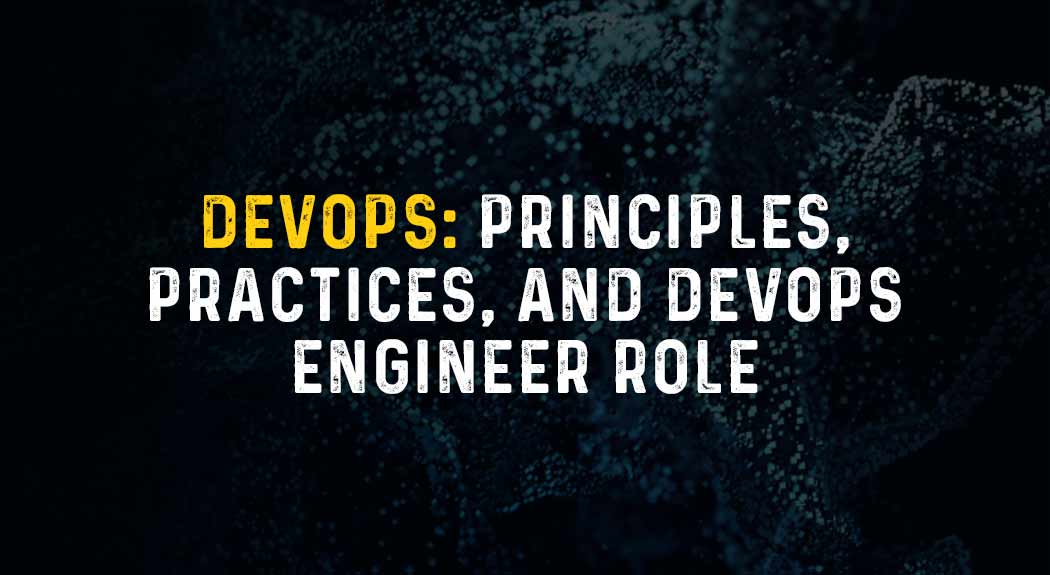
Emerging technological industries are constantly changing. Over the past ten years, platforms and apps have expanded astronomically, and supporting development approaches have changed significantly. Agile, Scrum, DevOps, and CI/CD concepts have dominated the digital economy. DevOps specialists are in high demand across various positions, and this need is rising steadily.
In this blog, we shall discuss the devops engineer job description, devops roles and responsibilities, what is devops and devops methodology. Before moving on to the in-depth understanding of Devops, we can discuss the future scope of devops and what devops concepts are.
Join DevOps Online Training and learn DevOps Principles, the DevOps Ecosystem, Opportunities for DevOps Engineer and the devops engineer job description.
What are devops concepts?
By resolving the disputes between development and operations teams, which were one of the main issues that organizations faced for a long time, DevOps is revolutionizing software development and deployment in enterprises. Many of you in the technical profession or the IT industry are already aware of this.
So companies that employ DevOps concepts accomplish more work faster. Software solutions can be delivered quickly by enterprises with successful DevOps implementation.
As a result, it helps to prevent and address production-related issues, which enhances customer satisfaction, feedback, and communication.
In a nutshell, businesses using DevOps tools in their operations gain the technical advantages listed below:
Advantages for business:
Scope of Devops:
Businesses worldwide adopt DevOps-related technologies and methodologies to enable continuous integration and delivery of software-based products and services. As companies try to employ connected technologies to stay ahead of their competition, demand for DevOps expertise is rising.
DevOps job postings have increased by 75% on popular job search engines like indeed.com, while 50% on social media sites like LinkedIn.
DevOps developers are enabling businesses to use automation to boost productivity. The DevOps technique is helping companies to increase and perform well (20 times faster deployment than competitors). They are also willing to hire experienced DevOps professionals. According to the most recent Report, DevOps Engineers earn an average salary of 4-4.5 lakhs per year, ranking them among the top five lucrative tech careers.
Why Devops is utilized in software development?
For a very long time, development and operations were distinct parts. The code that developers had produced was merged and distributed by system administrators. These two divisions did not interact much. Therefore specialists often worked on projects on their own.
It was acceptable for waterfall development to predominate. However, adopting Agile and continuous workflow in the software development industry has rendered this paradigm outdated. Short releases and frequent deployments occurring every two weeks or daily require a new strategy and new team roles.
DevOps is one of the software development techniques now receiving the most attention. It is used by various market leaders, including Facebook, Netflix, Amazon, Etsy, and many more. Therefore, if you consider embracing DevOps for improved performance, commercial success, and competition, you should take the first step and hire a DevOps engineer. But first, let's look more closely at DevOps and how it improves the delivery of products.
What is DevOps:
DevOps is a term that refers to both development and operations. It is a technique that aims to incorporate operations (deployment and integration), quality control, and development into one cohesive set of continuous processes. The logical progression of Agile and continuous delivery is called devops methodology.
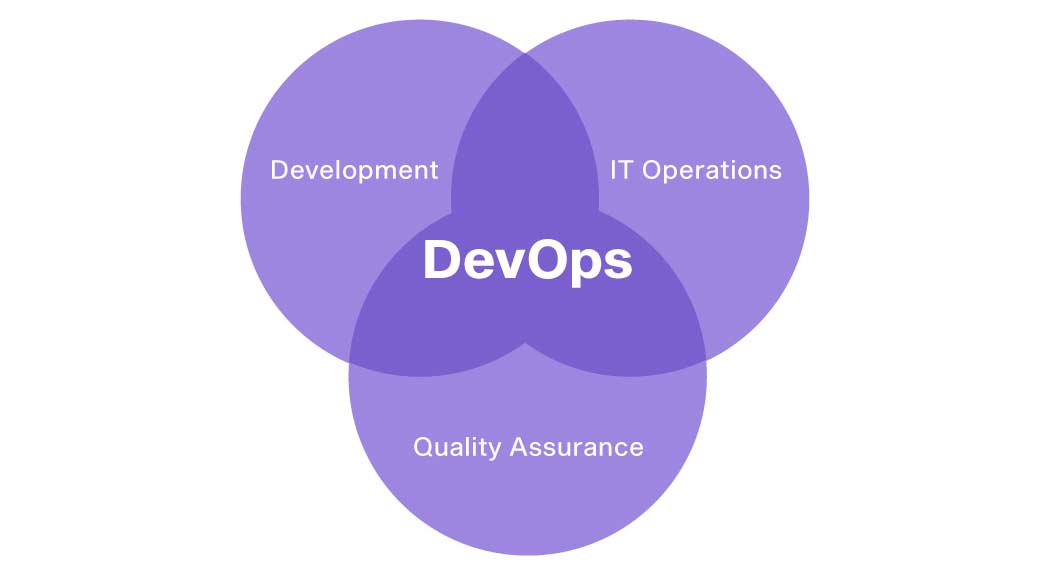
So, by utilizing the devops methodology, the organization obtains the core benefits that include technical, business, and cultural aspects of development. Join PHP Training in Chennai, which will help you better understand Data Types, Debugging, Embedding PHP code on the Page, Executing the dynamic text, etc.
Devops roles and responsibilities:
Quicker and better product releases
DevOps accelerates product release by implementing continuous delivery, encouraging quicker feedback, and allowing developers to address system flaws early on.
By utilizing DevOps, the team can focus on creating a high-quality product while automating several activities.
Increased receptivity to client needs
By updating and adding new features, a team may be able to respond to customer change requests more quickly via DevOps. As a result, the time to market and value delivery rates increase.
Improve working circumstances
The principles and methods of DevOps encourage better communication among team members, increased output, and increased ability. Teams that use DevOps are thought to be more effective and skilled overall. A DevOps team comprises developers and operators who collaborate on projects.
To have a profound understanding of devops roles and responsibilities, you can join DevOps Training in Chennai andlearn how Continous Integration is possible using Jenkins, Ansible, Docker, Puppet, etc.
DevOps principles:
To highlight the core tenets of DevOps, Damon Edwards and John Willis created the CAMS model in 2010. The acronym CAMS stands for Culture, Automation, Measurement, and Sharing. Since they are the cornerstones of DevOps, we will examine them in greater detail.
Culture
DevOps is based on the approach and culture that encourages close collaboration between teams managing infrastructure and creating software. The guiding principles of this culture are as follows.
Continuous communication and cooperation
These have been the foundations of DevOps from the start. Your team should function as a unit, aware of each person's requirements and expectations.
Gradual modifications
Delivery teams can deploy a product to users while still having a chance to make adjustments and turn back if something goes wrong by implementing progressive rollouts.
End-to-end accountability
When a team works cohesively and looks for ways to make the responsibilities of other members easier, They are all working for the same goal and bearing equal responsibility for the project from beginning to end.
Early problem-solving
DevOps requires tasks to be performed as early as the project lifecycle. As a result, problems can be fixed as early as possible.
Automation of processes
Automation has many developing, testing, configuring, and delivery processes, which is the cornerstone of DevOps. These are the steps involved in the devops methodology. Due to these features, we can avoid time-consuming and repetitive tasks.
If you want to become an automation tester, you can join Selenium Training in Chennai, which will help you have a profound understanding of testing strategies, Installing Selenium IDE and many other core concepts.
Measurement of Key Performance Indicators
All decisions should be based on factual facts. Tracking how the DevOps flow's tasks evolve is crucial to attaining optimum performance. It is possible to understand what works effectively and needs to be improved in a system by measuring various metrics.
Sharing
The DevOps ethos best encapsulates this statement, emphasizing teamwork's value. Teams must exchange ideas, practice guidelines, and expertise because doing so promotes openness, creates collective intelligence, and breaks boundaries.
Because there was just one employee with the required expertise, you don't want to stop the entire development process because they took time off or left.
DevOps model and practices:
To implement DevOps, a delivery cycle that involves planning, building, testing, implementation, deployment, and monitoring is necessary.
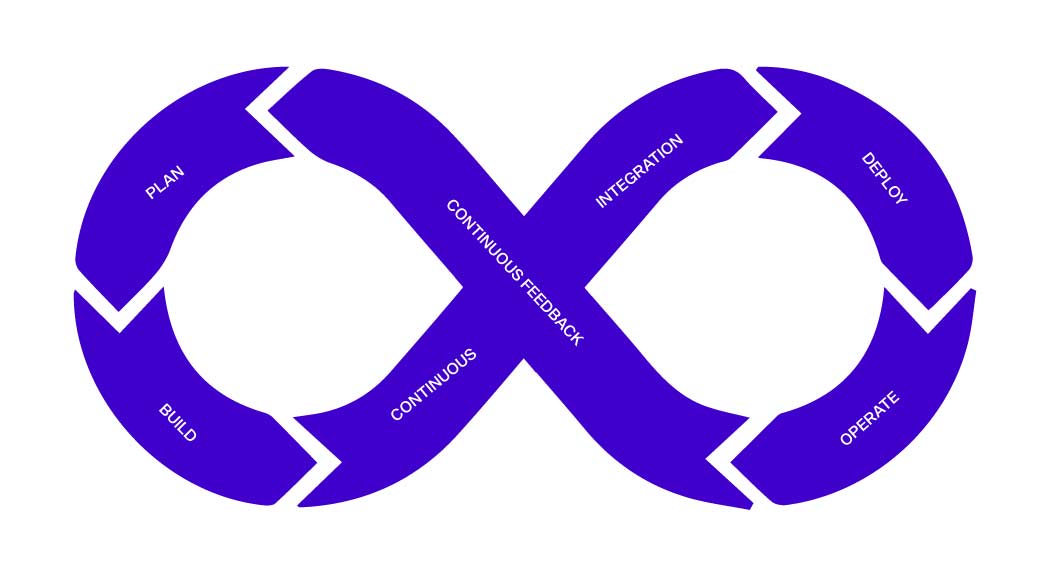
Agile planning
Agile planning breaks work into brief iterations (like sprints) to improve the frequency of releases instead of traditional project management techniques. As a result, the team merely focuses on its broad goals while creating detailed plans for the following two iterations. This permits flexibility and pivots as soon as the concepts are tested on an early product increment.
If you are interested in learning the python programming language, you can join Python Training in Bangalore, which will help you understand the python features, Conditional Statements, Syntax, Strings, etc.
Continuous development
The idea of continuous "everything" encompasses iterative or continuous software development, in which all work is broken down into smaller chunks for better and more efficient output. Engineers routinely contribute small pieces of code throughout the day to simplify testing. Both code builds, and unit tests are automated.
Continuous automated testing
A quality assurance team uses automation tools like Selenium, Ranorex, UFT, etc., to test committed code. When problems and vulnerabilities are found, the engineering team receives them back. Version control is also mandatory at this stage to evaluate integration issues before they arise.
Developers can track file changes and distribute them to other team members wherever they use a version control system (VCS).
If you are interested in learning selenium, you can join Selenium Training in Bangalore, which is a meticulously designed course for Bangalore-based students in aiding them in learning from the comfort of their homes.
Continuous integration and continuous delivery (CI/CD)
It is a primary devops methodology. The build is created, and automated tests are run to validate the developer's modifications. As a result, if updates are made to the release branch before the scheduled release date, integration issues won't arise.
Continuous integration focuses on testing automation to ensure that the application is not broken while integrating new commits into the main branch.
As we previously discussed, the continuous delivery methodology mainly focuses on automation and unifies development, testing, and deployment processes into a streamlined process. This stage makes it possible for production environments to get code upgrades automatically.
Continuous deployment
The code is now prepared to run in production on a public server. Code deployment must be made available to many users and avoid interfering with existing functionalities.
Frequent deployment allows for early testing and verification of new features, enabling a "fail fast" strategy. Engineers can deliver a product increment with the help of several automated technologies. The most popular ones are Google Cloud Deployment Manager, Azure Resource Manager, Chef, and Puppet.
Continuous monitoring
The DevOps lifecycle's final stage is focused on evaluating the entire cycle. Moreover, continuous monitoring will help you detect errors and enhance the product's functionality. Monitoring aims to identify significant issues in a process and analyze user and team input.
Infrastructure as a code
The infrastructure makes continuous delivery, and DevOps processes possible by a code (IaC) approach. Using scripts, we can automatically set the deployment environment to the required layout regardless of its beginning state.
Microservices
The microservice architecture method entails creating a single application as a collection of unique services that communicate with one another but are installed independently. By building an application this way, you can isolate potential problems and ensure that the other application features won't be impacted if one service goes down.
Cloud infrastructure
Nowadays, most businesses employ hybrid clouds, including public and private clouds. DevOps-driven teams can significantly minimize their effort by removing server-management activities. It is the recent development of serverless designs on clouds. Workflow automation tools are a crucial component of these procedures. Here, we'll outline the process and its benefits.
Devops roles and responsibilities:Its tools
DevOps will primarily enhance the delivery pipeline and integration process by automating these operations. Due to this, the reach of product at the market becomes on time.
The team must acquire this automatic release methodology. Although some tasks are still automated with special scripts, DevOps engineers use various solutions nowadays. Let's look at the most popular instances.
Server configuration
-
Server configuration tools are used to set up and manage the server in devops.
-
Puppet is the most popular tool for infrastructure management
-
Chef is used for code management
-
Ansible is used to automate the application deployment, configuration management, etc.
CI/CD
These steps require task-specific automation tools. We can use the GitLab Continuous Integration tool or Jenkins with extra plugins to modify the continuous delivery pipeline.
Containerization and orchestration
-
In this stage, Docker builds and packs code into software products.
-
The most used container orchestration platforms are commercial OpenShift and open-source Kubernetes.
Monitoring and alerting:
In DevOps, Nagios, a robust tool that delivers statistics in visual reports or open-source Prometheus, are frequently used to facilitate monitoring and alerting. Now, we shall discuss the devops engineer skills and roles and responsibilities.
A quick recap on devops tools
-
Continuous management (Puppet, Chef, and Ansible)
-
Continuous integration (Travis CI, Jenkins, and Bamboo)
-
Continuous testing (Test Complete, Docker, and Tricentis Tosca)
-
Continuous monitoring (Nagios, Sensu, and Splunk)
A DevOps Engineer: role and responsibilities
Job descriptions vary depending on the organization. Engineers with broader skill sets and responsibilities are sought after by smaller firms. For instance, the job description can mention working with developers on product development. Larger companies might look for an engineer for a particular stage of the DevOps lifecycle that will operate with a specific automation solution.
Join Java Training in Chennai, which will help you understand the core concepts of java, such as java tools, frameworks, libraries, etc.
Devops engineer roles:
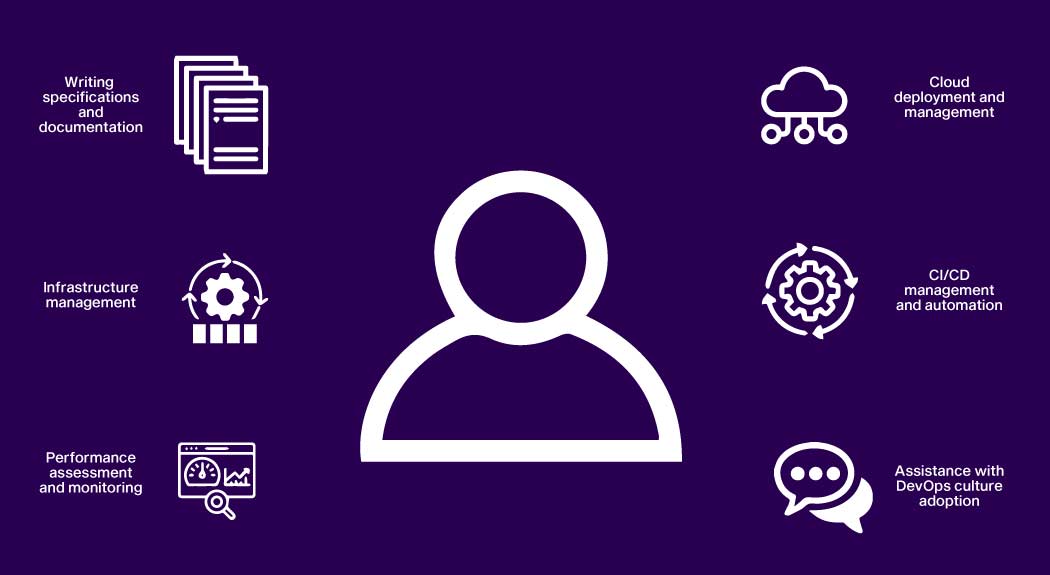
Devops engineer job description:
-
Knowledge of software development and its tools and technology.
-
Continuous deployment and continuous integration (CI/CD) management
-
Experience with data management
-
in-depth understanding of infrastructure as code models to solve integration problems
In addition, A DevOps engineer may also be in charge of managing and maintaining the IT infrastructure, which consists of:
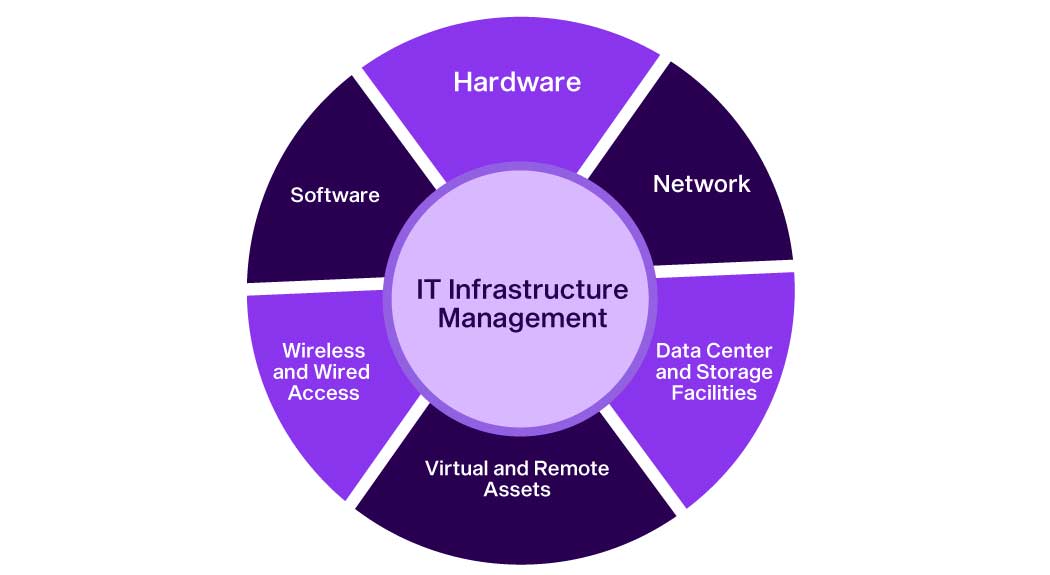
DevOps engineer skill set
When you intend to apply for the devops- related job role, you must have these skills:
-
Tech background. Should have a degree in computer science, engineering, or other related fields.
-
Automation tool experience. Tools include GitHub, Chef, Puppet, Jenkins, Ansible, Nagios, and Docker. Must also have experience with public clouds such as Amazon AWS, Microsoft Azure, and Google Cloud.
-
Programming skills. Must have programming skills including Java, C#, C++, Python, PHP, Ruby, etc., or at least some of these languages.
-
Knowledge of database systems: Experience with both SQL and NoSQL database models
-
Communication and interpersonal skills
If you are interested in learning AWS, you can join AWS Training In Chennai, which will help you have a profound understanding of the infrastructure of AWS, Services and much more core concepts.
Now, you would have understood the devops engineer job description, devops roles and responsibilities, what is devops and devops methodology. So, to comprehensively understand DevOps, you can join DevOps Training in Bangalore, which will help you have an in-depth understanding of DevOps Principles, the DevOps Ecosystem, and devops methodology.